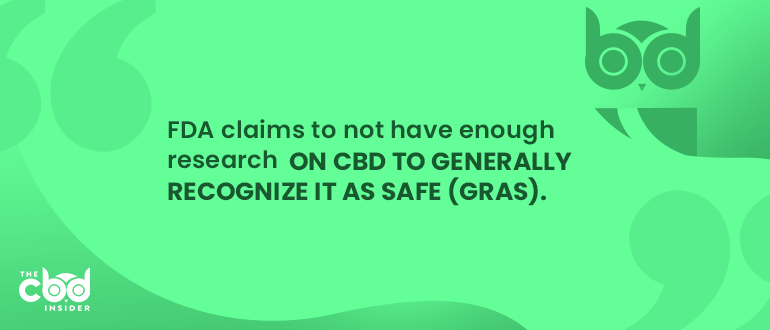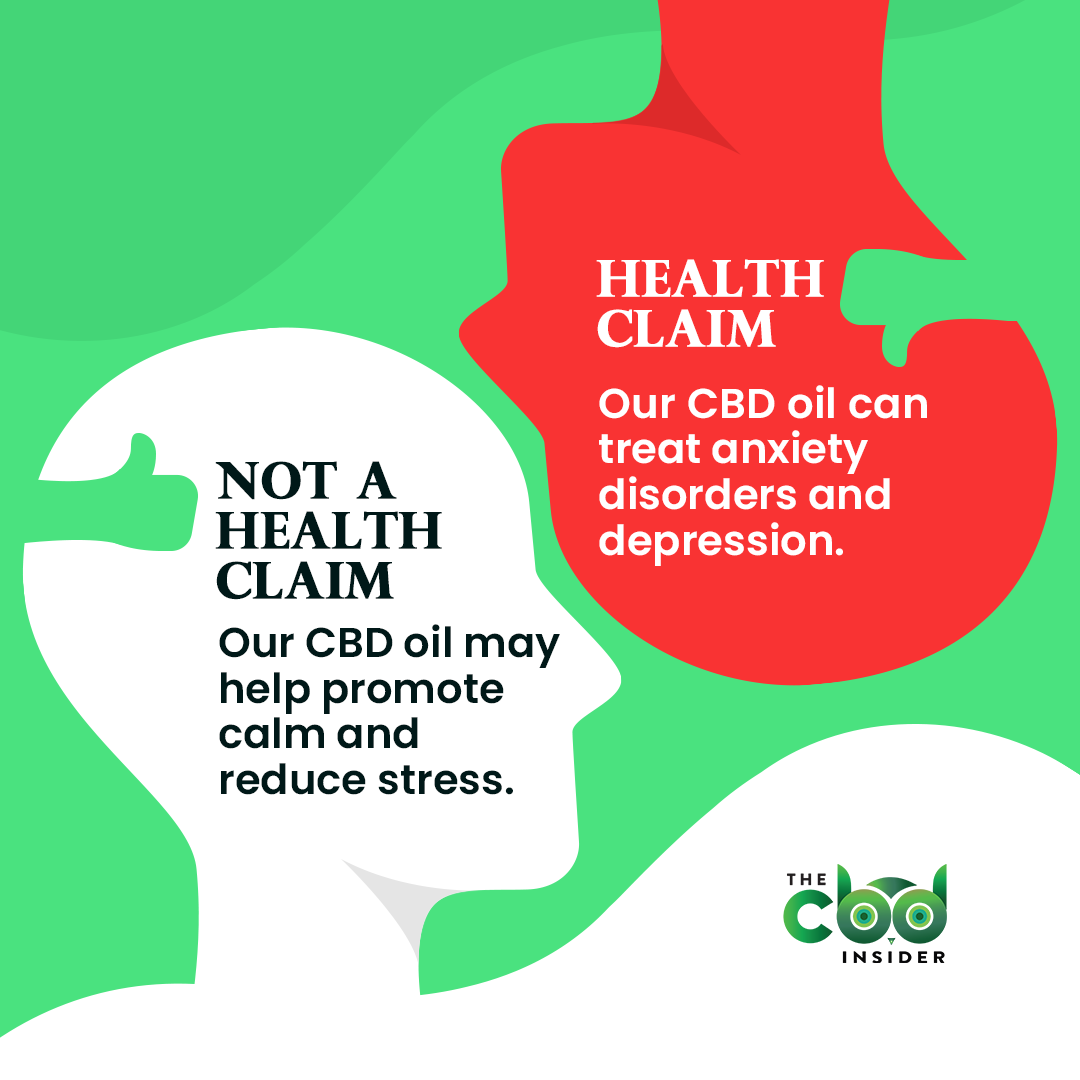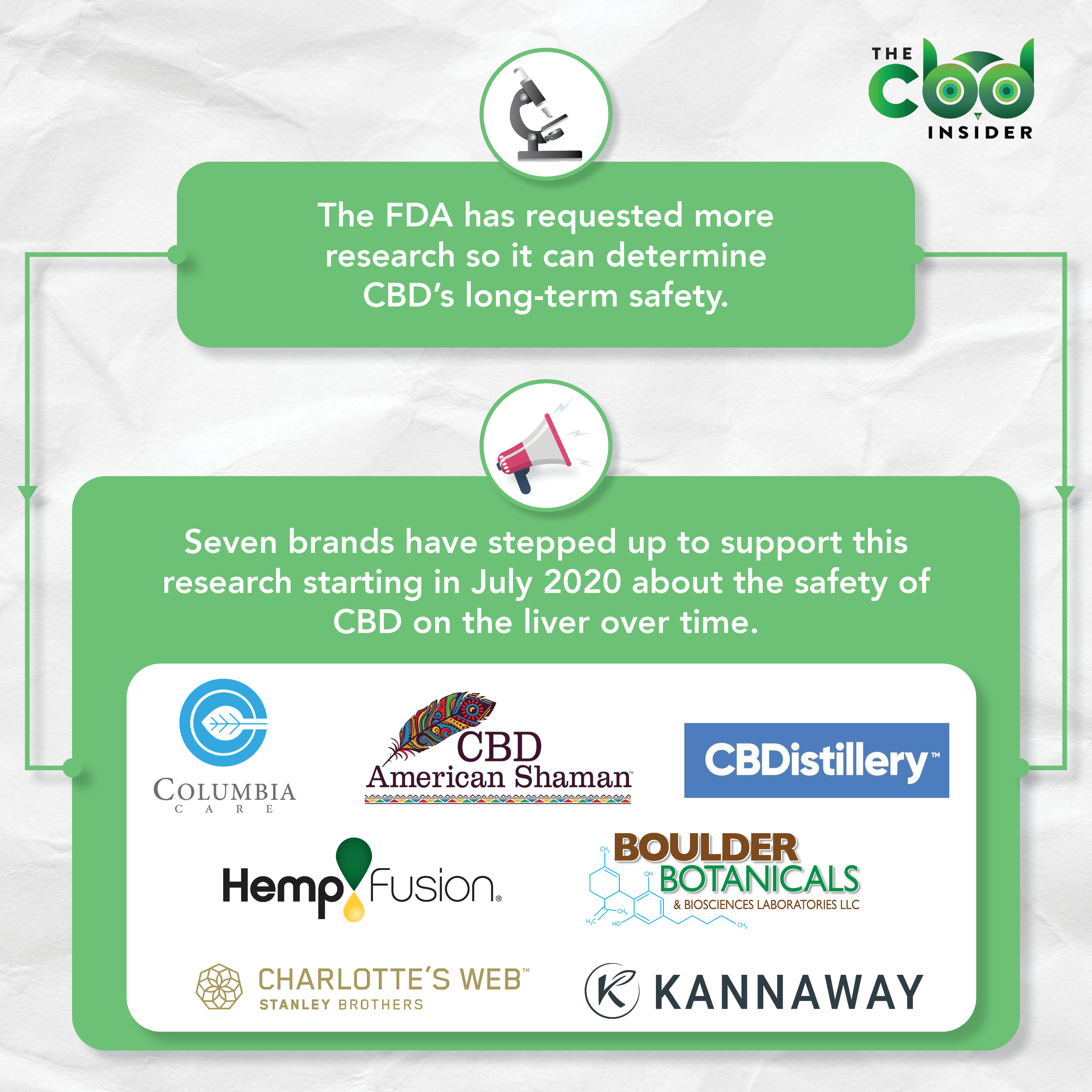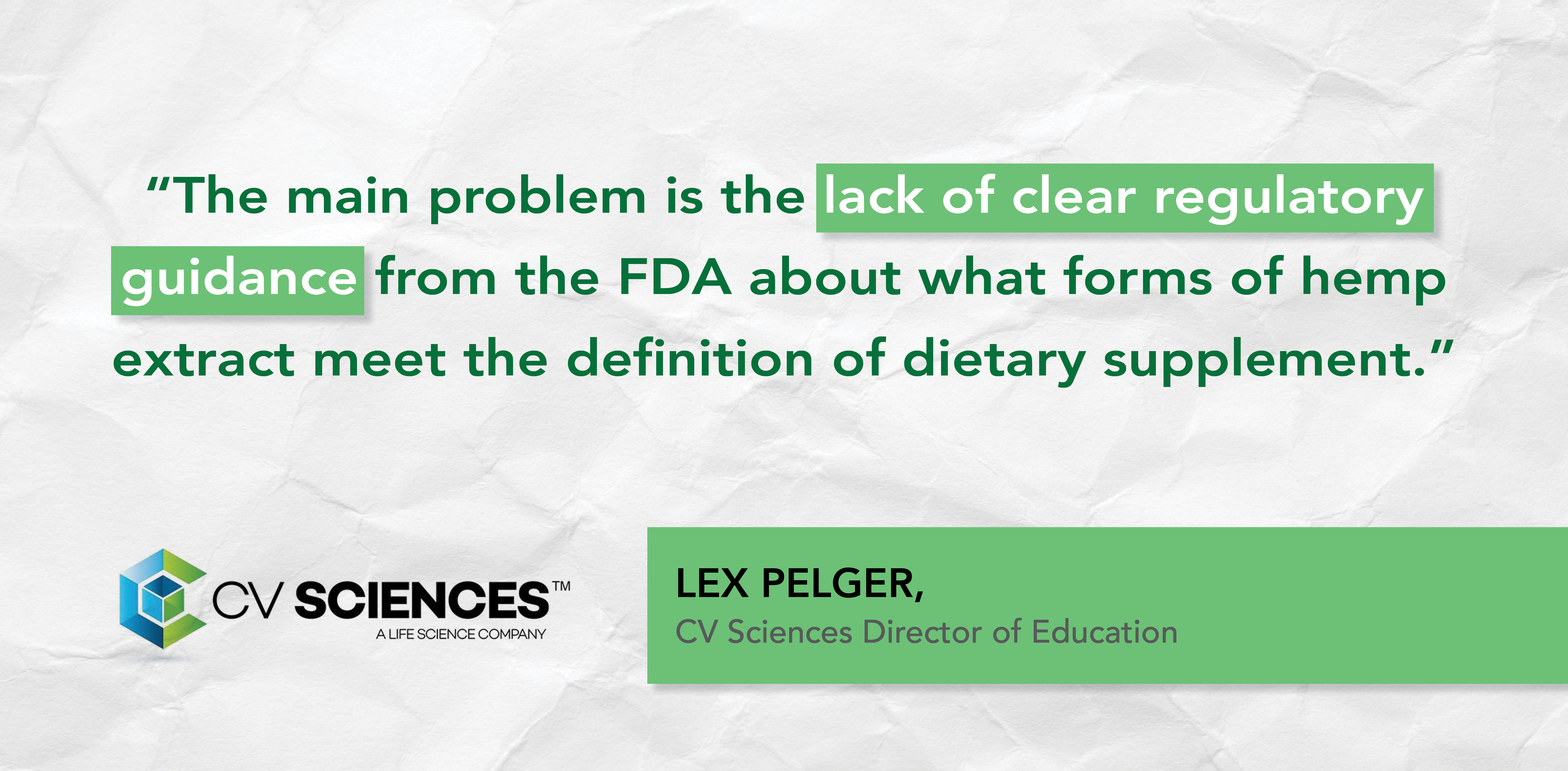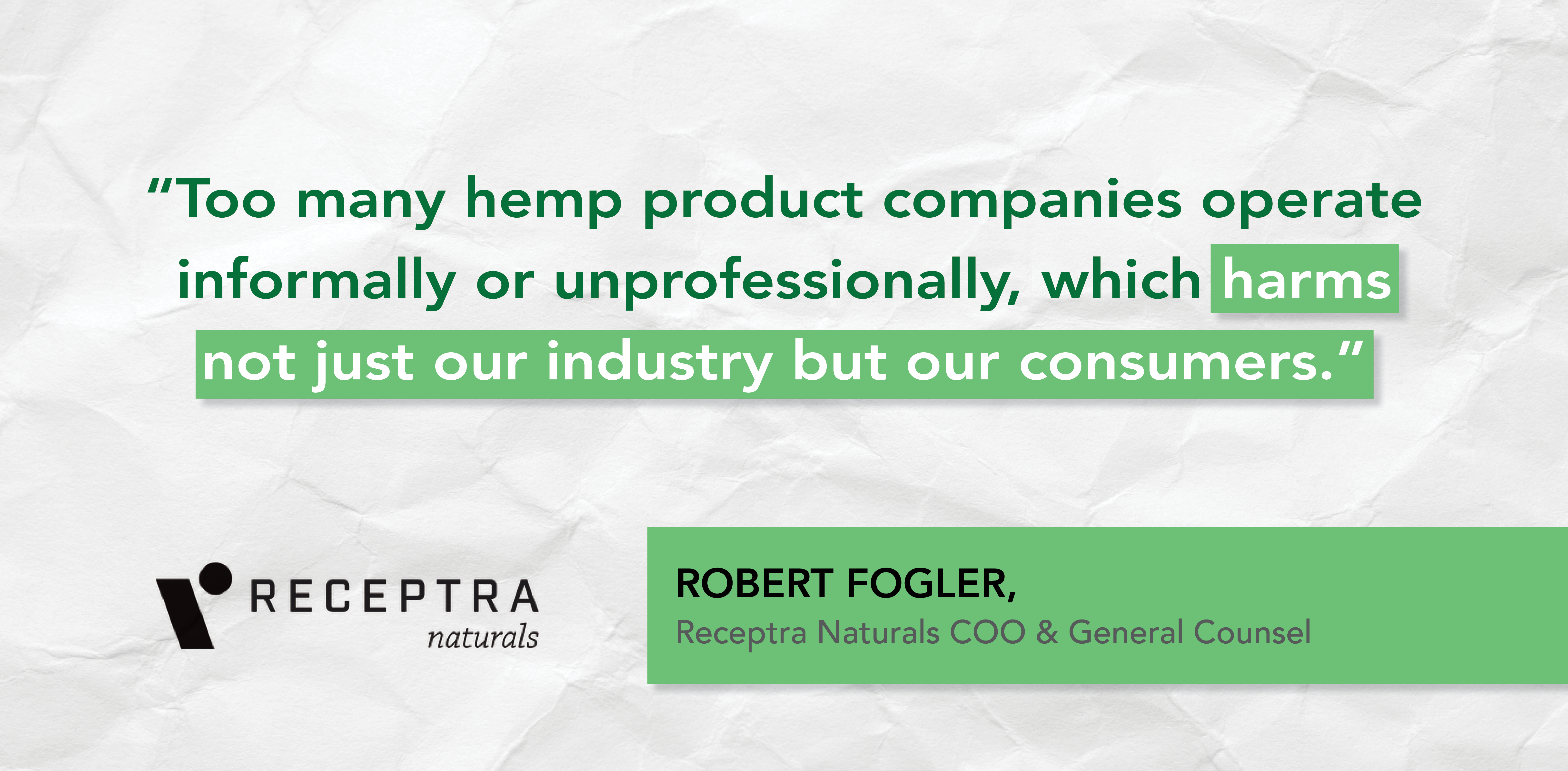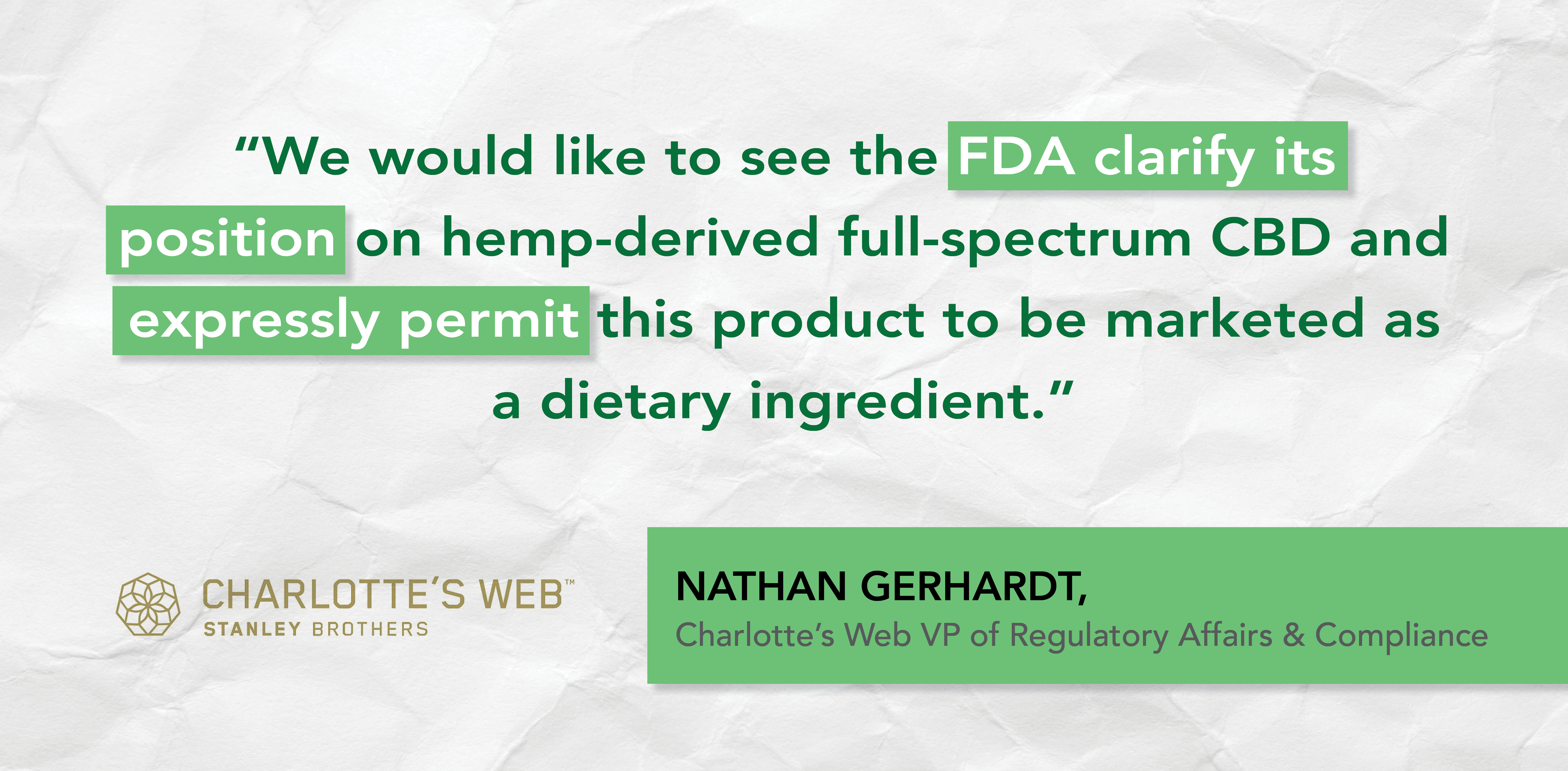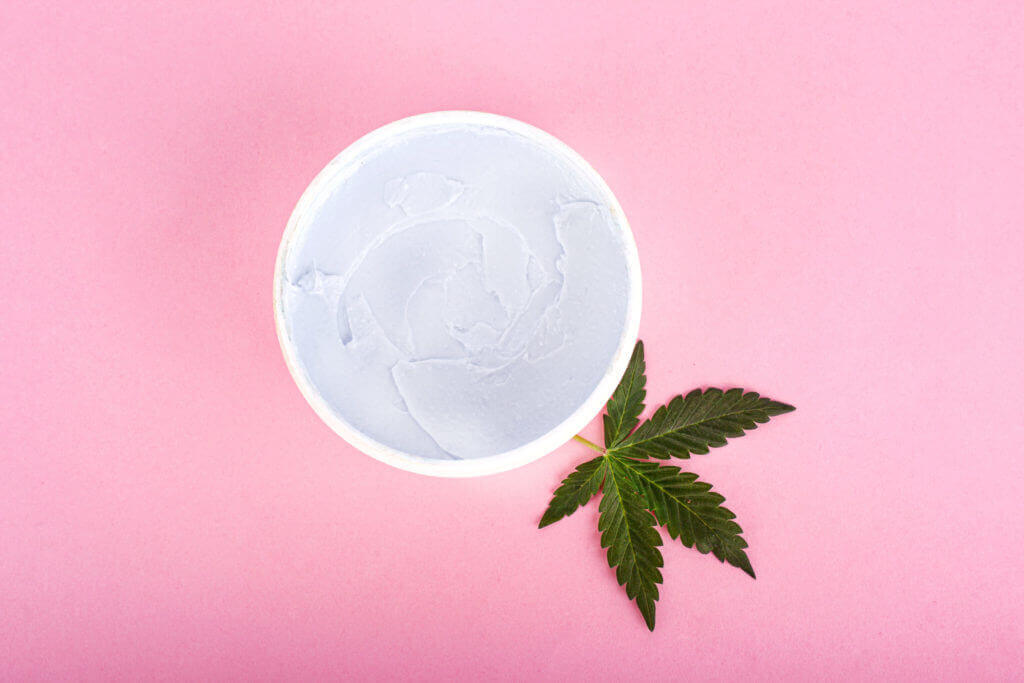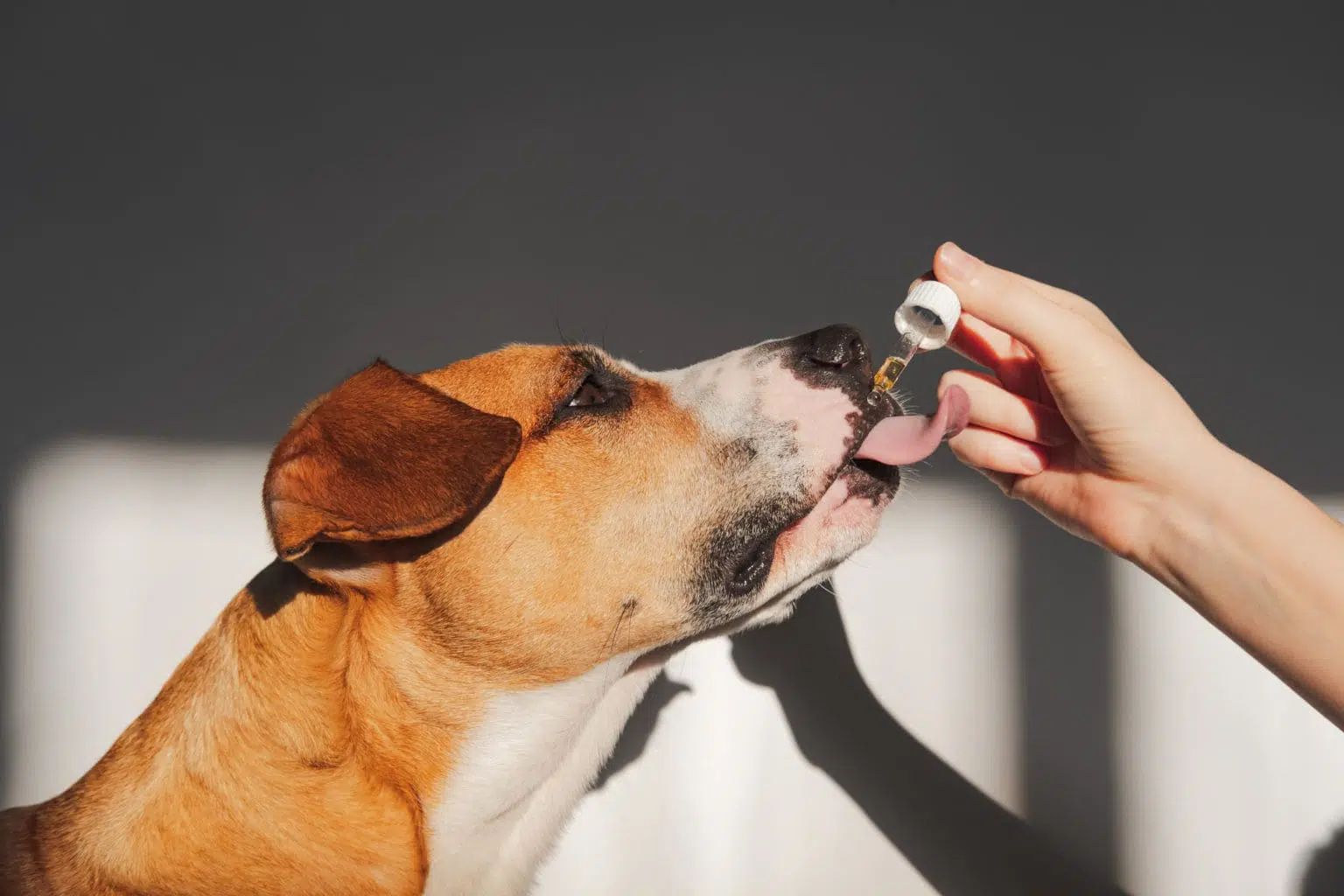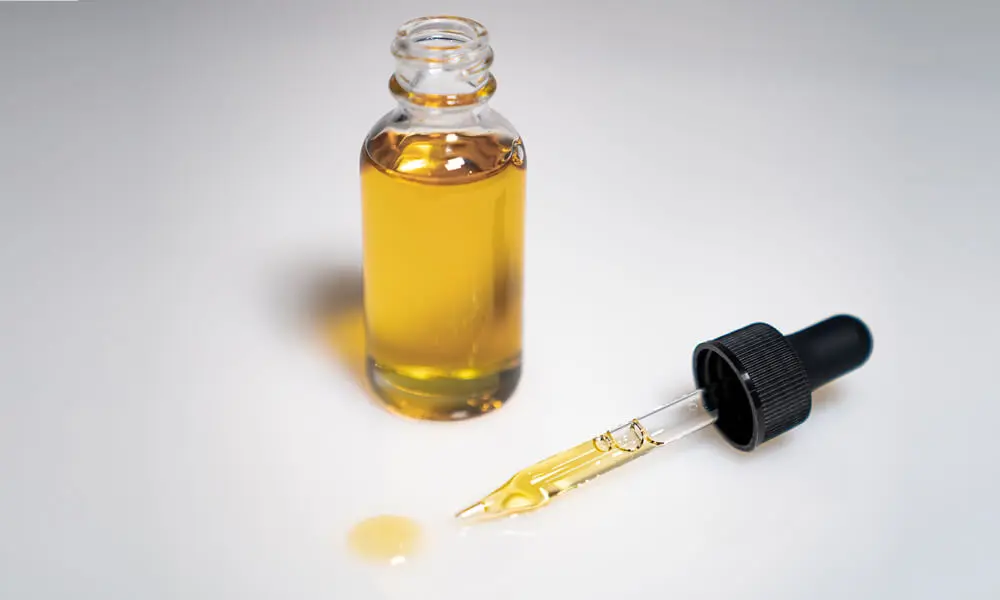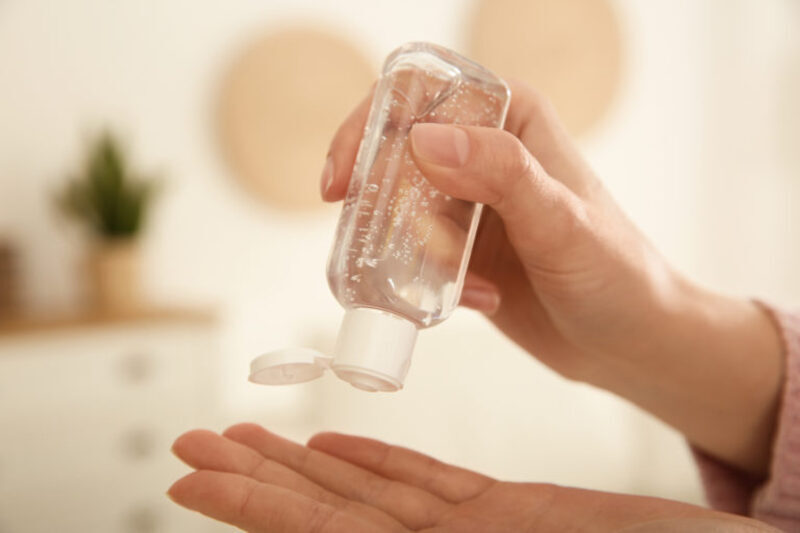-
- Market Research
- |
- CBD Near Me
- |
- Giveaways
- |
- Newsletter
- |
- Contact
- |
- Advertise
- |
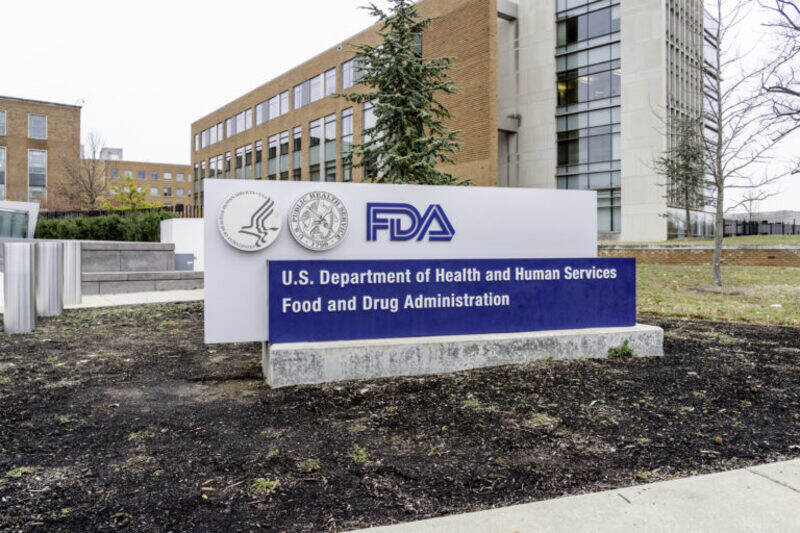
Table of Contents
Marketing CBD is a perilous task.
With a flurry of warning letters and lawsuits from the US Food and Drug Administration (FDA) and customers, respectively, even the most reputable CBD brands have found themselves caught in a legal conflict.
Why all the madness?
Let’s explore.
| THE FDA’s VIEW ON CBD: |
| CBD is an active ingredient in a drug called Epidiolex. |
| CBD is a drug, therefore, according to the Food, Drug, and Cosmetic Act, it cannot be marketed as a dietary supplement. |
| FDA does not consider CBD to be GRAS (Generally Recognized As Safe) and cannot be considered a food additive; thus, it is calling for more research on CBD’s safety. |
| FDA will crack down on CBD companies that make medical claims. |
The FDA’s Current Stance On CBD Products
Marketing CBD with unclear guidelines is sort of like sailing a ship through iceberg-filled waters in bad visibility.
You know the icebergs are there—you’re just not sure where. CBD companies attempt to navigate these tricky marketing waters and look out for legal icebergs that threaten to take down the whole ship.
But imagine trying to explain that a product might help someone with anxiety when you can’t use the word “anxiety” or post customer reviews on your website that detail how CBD helped them with “X” because you may get a warning letter for “making a medical claim.”
That’s the situation CBD companies are faced with, and it presents a significant challenge for all CBD brands who are attempting to play Taboo while accurately describing the purpose of their products to customers.
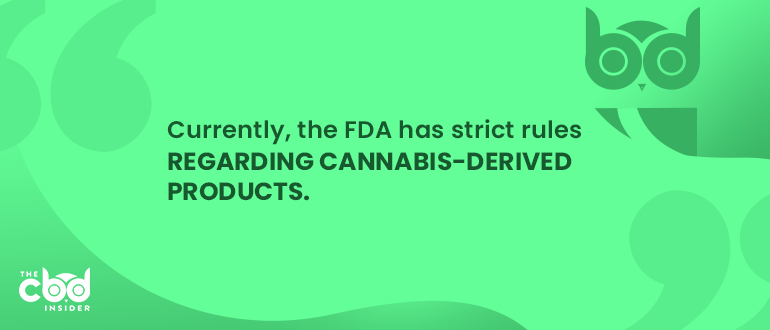
Currently, the FDA rules have three main tenets in regard to cannabis-derived products:
- CBD cannot be marketed/sold as dietary supplements
- CBD cannot be added to food products
- CBD brands cannot make unfounded health claims
CBD Cannot Be Marketed/Sold As A Dietary Supplement Because It’s a ‘Drug’
Under section 201(ff)(3)(B) of the Food, Drug, & Cosmetic (FD&C) Act [21 U.S.C. § 321(ff)(3)(B)]:
“THC and CBD products are excluded from the dietary supplement definition. Under that provision, if a substance (such as THC or CBD) is an active ingredient in a drug product that has been approved under section 505 of the FD&C Act [21 U.S.C. § 355], or has been authorized for investigation as a new drug for which substantial clinical investigations have been instituted and for which the existence of such investigations has been made public, then products containing that substance are excluded from the definition of a dietary supplement. There is an exception to section 201(ff)(3)(B) if the substance was “marketed as” a dietary supplement or as a conventional food before the drug was approved or before the new drug investigations were authorized, as applicable. However, the agency is not aware of any evidence that CBD or THC were marketed in conventional foods or dietary supplements prior to being subject to substantial clinical investigations. Therefore, both CBD and THC are excluded from the dietary supplement definition and cannot be sold or marketed as such.“
What it means:
This section of the FD&C Act says CBD cannot be marketed as a dietary supplement because it was being tested in clinical investigations as a drug and had not been sold as a supplement or food before these investigations, according to the FDA.
Therefore, because the FDA sees CBD as a drug, all CBD companies must technically get FDA approval before selling their products.
If CBD had been marketed as a dietary supplement or food before testing had begun (some companies suggest it was), then all of the confusion would have been avoided.
“We all still struggle with the ‘drug exclusion’ position taken by the FDA, which technically classifies our products in a gray-area where we can’t be ingestible as either a ’food’ or a ‘dietary supplement,’” said Robert Fogler, the COO & General Counsel for Receptra Naturals to The CBD Insider. “The FDA’s current position is controversial and legally vulnerable. It places companies like ours in an uncertain legal limbo and constantly challenges us to properly balance consumer education and wellness with perceived rote compliance in a legal gray zone.”
CBD Cannot Be Added To Food Products
Under section 301(ll) of the FD&C Act [21 U.S.C. § 331(ll)]:
“It is prohibited to introduce or deliver for introduction into interstate commerce any food (including any animal food or feed) to which has been added a substance which is an active ingredient in a drug product that has been approved under section 505 of the FD&C Act [21 U.S.C. § 355], or a drug for which substantial clinical investigations have been instituted and for which the existence of such investigations has been made public. There are exceptions, including when the drug was marketed in food before the drug was approved or before the substantial clinical investigations involving the drug had been instituted or, in the case of animal feed, that the drug is a new animal drug approved for use in feed and used according to the approved labeling. However, based on available evidence, FDA has concluded that none of these is the case for THC or CBD. FDA has therefore concluded that it is a prohibited act to introduce or deliver for introduction into interstate commerce any food (including any animal food or feed) to which THC or CBD has been added. In addition, the FDA is not aware of any basis to conclude that CBD is generally recognized as safe (GRAS) among qualified experts for its use in human or animal food. There also is no food additive regulation which authorizes the use of CBD as an ingredient in human food or animal food, and the agency is not aware of any other exemption from the food additive definition that would apply to CBD. CBD is therefore an unapproved food additive, and its use in human or animal food violates the FD&C Act for reasons that are independent of its status as a drug ingredient.“
What it means:
This is essentially a rehash of the first section (CBD is seen as a drug and is not allowed into the food supply), but it contains a few nuances.
First, the FDA does not consider CBD to be GRAS (generally recognized as safe), a designation given to food ingredients after research deems it generally safe for human consumption. The lack of safety research has been a critical obstacle to the agency creating a regulatory framework for CBD.
Second, some have advocated for CBD to be defined as a food additive, but the FDA argues that CBD does not align with that definition.
CBD Brands Can Not Make Unfounded Health Claims
The answer to this question in the FDA’s Q&A has important language that we’re going to highlight below (emphasis ours):
“There are no other FDA-approved drug products that contain CBD [besides Epidiolex]. We are aware that some firms are marketing CBD products to treat diseases or for other therapeutic uses, and we have issued several warning letters to such firms.
Under the FD&C Act, any product intended to have a therapeutic or medical use, and any product (other than a food) that is intended to affect the structure or function of the body of humans or animals, is a drug. Drugs must generally either receive premarket approval by FDA through the New Drug Application (NDA) process or conform to a “monograph” for a particular drug category, as established by FDA’s Over-the-Counter (OTC) Drug Review. CBD was not an ingredient considered under the OTC drug review. An unapproved new drug cannot be distributed or sold in interstate commerce.
FDA continues to be concerned at the proliferation of products asserting to contain CBD that are marketed for therapeutic or medical uses although they have not been approved by the FDA. Often such products are sold online and are therefore available throughout the country. Selling unapproved products with unsubstantiated therapeutic claims is not only a violation of the law, but also can put patients at risk, as these products have not been proven to be safe or effective. This deceptive marketing of unproven treatments also raises significant public health concerns, because patients and other consumers may be influenced not to use approved therapies to treat serious and even fatal diseases.“
This highlights the danger that CBD companies may be steering the public towards when they make unfounded claims about CBD’s therapeutic capabilities. When a company says “don’t take that, take this instead,” it could put consumers in danger.
“No medical claims should be made for a dietary supplement,” said CV Sciences Director of Education, Lex Pelger in an email to The CBD Insider. “We don’t need to make claims for CBD because people understand that it works. The same rules that apply to all dietary supplements are applicable to CBD-rich hemp extracts.”
The FDA has cracked down on brands that make these claims with warning letters, several of which can be found here; this has generally been the extent of the FDA’s enforcement of its drug exclusion policy.
The FDA Needs More Safety Research on CBD
Further information from the FDA’s Q&A (emphasis ours):
“Unlike drugs approved by FDA, products that have not been subject to FDA review as part of the drug approval process have not been evaluated as to whether they work, what the proper dosage may be if they do work, how they could interact with other drugs, or whether they have dangerous side effects or other safety concerns.
The agency has and will continue to monitor the marketplace and take action as needed to protect the public health against companies illegally selling cannabis and cannabis-derived products that can put consumers at risk and that are being marketed for therapeutic uses for which they are not approved. At the same time, FDA recognizes the potential therapeutic opportunities that cannabis or cannabis-derived compounds could offer and acknowledges the significant interest in these possibilities. FDA continues to believe that the drug approval process represents the best way to help ensure that safe and effective new medicines, including any drugs derived from cannabis, are available to patients in need of appropriate medical therapy. The Center for Drug Evaluation and Research (CDER) is committed to supporting the development of new drugs, including cannabis and cannabis-derived drugs, through the investigational new drug (IND) and drug approval process.“
The takeaway here is that the FDA acknowledges the public interest in CBD, but interest isn’t enough on its own. Real, science-based proof of efficacy and safety must be presented before the FDA will create a pathway for CBD products to be marketed appropriately.
The good news is that there is momentum on the research front.
Charlotte’s Web and CBDistillery are among seven companies sponsoring research that will study the effect of CBD on the liver. The study, which begins this month, is a direct response to the FDA’s report to Congress back in March on the potential pathways for the marketing of hemp-derived CBD products.
The hope is that if the study shows positive results, then the FDA will finalize its regulatory framework for CBD as a dietary supplement.
“We understand progress takes time and the proper research is still needed to make sure the right regulation is put into place,” said John Harloe, J.D., Ph.D., General Counsel for CBDistillery in an email to The CBD Insider. “That’s why we are making sure to use our roles as leaders in the space to support the FDA by educating the public on CBD and pairing with programs such as ValidCare to conduct studies that will provide the FDA with scientific evidence needed to move forward.”
Results from this study are expected around the end of 2020.
CBD Companies Speak Out on the Challenges of Marketing CBD
FDA regulations have created challenges for CBD companies to market their products, and while it’s easy to assume they would view the FDA as an evil “Big Brother,” that’s not necessarily the case. Reputable CBD companies who are doing their due diligence are in favor of having clear regulations in place to protect the integrity of the industry.
CV Sciences, for one, says it finds the FDA’s guidance on the marketing of dietary supplements to be reasonable but has issues with clarity over CBD-rich hemp extract.
“The main problem is the lack of clear regulatory guidance from the FDA about what forms of hemp extract meet the definition of a dietary supplement,” said Pelger. “This has opened up companies to baseless lawsuits about false marketing because the FDA hasn’t officially declared CBD-rich hemp extracts to be a dietary supplement.”
Tom Siciliano, Elixinol CEO for the Americas, who also serves on the executive board of the U.S. Hemp Roundtable, says the changing landscape is challenging, but vital for upholding standards within the industry.
“We are consistently monitoring the landscape, especially at the state level where rules and regulations can differ,” he said. “Although it can be challenging, we acknowledge the importance of these evolving FDA rules, and the team is always re-evaluating our work to ensure compliance.”
According to Fogler, Receptra Naturals actually advocates for increased FDA regulation.
“Too many hemp product companies operate informally or unprofessionally, which harms not just our industry but our consumers,” he said. “All companies selling hemp cosmetics or ingestible products should be required to display the highest level of transparency, to which we adhere.”
The companies that don’t follow the rules are vulnerable to legal action. The FDA has issued stern warnings to companies making false claims, while others face costly lawsuits. Some judges have issued stays on the lawsuits while they wait for concrete guidelines on CBD regulation from the FDA.
So how do CBD companies ensure they are following the available regulations in the meantime?
How CBD Companies Abide By Ever-Changing Regulations
Not only do CBD companies have to stay current with FDA guidelines, but they also must follow the varying state and local regulations.
According to Nathan Gerhardt, Vice President of Regulatory Affairs and Compliance at Charlotte’s Web, the company “utilizes in-house legal personnel and specialized regulatory law firms to assist in reviewing and approving packaging and marketing materials.”
Receptra Naturals also has a full-time, in-house legal staff that reviews all FDA guidelines, statements, and regulations, and engages with outside law firms for additional safety.
“We take regulation and safety very seriously,” said Fogler. “We engage an outside law firm specializing in cannabis law to advise us on how to comply with the latest national, state and local regulations across the country. Any marketing materials that may present significant legal risk (or risk of misinterpretation by consumers) are reviewed by our entire in-house legal staff and our outside law firm.
“And our principles align with the FDA’s: To ensure the safety, efficacy and security of our products and to promote science-based education for our consumers’ public health and wellbeing. Where gray areas exist, we work to err on the side of the safety and wellbeing of our consumers.”
CV Sciences have taken things a little further, specifically addressing the safety concerns of the FDA.
“We were one of the first in the industry with a batch system for tracking products through every step of the manufacturing process and confirming their potency and safety with third-party testing,” said Pelger. “In addition, to help assuage the worries of the FDA on the safety and efficacy of CBD-rich hemp extracts, we’ve invested in the industry’s first self-affirmed GRAS (Generally Regarded as Safe) tests on hemp extracts and multiple clinical studies.”
CBDistillery uses a bit of creativity to create transparency and help its products stand out from the crowd.
“Currently, the challenges we face arise from the lack of education among retailers and marketing platforms that are unable to determine the regulatory landscape and therefore don’t want to get involved,” said Harloe. “While this has created roadblocks, it has also sparked ingenuity for companies such as ourself, to make breakthroughs on more traditional avenues like radio, print advertisements, billboards, out of home and some other social media platforms.
“These avenues have proven time and time again effective and have allowed us to look outside of the box to not only reach new audiences, but use creative approaches to stand out among the sea of emerging CBD companies looking to make a dollar off these three letters.”
What’s Next For The FDA & The CBD Industry
As for what companies would like to see changed about the current guidelines, the responses were unanimous: brands want hemp-derived CBD to be allowed to be marketed and sold as a dietary supplement.
“We would like to see the FDA clarify its position on hemp-derived full-spectrum CBD and expressly permit this product to be marketed as a dietary ingredient,” said Gerhardt.
If CBD attains this definition, CBD brands will have clear guidelines on how to safely market their products, which will help eliminate customer confusion.
“Like the FDA, we’d like Congress to clarify, and we’d prefer if Congress quickly and cleanly resolved these conflicts by passing HR 5587, a bipartisan bill to regulate hemp products through the existing strict food and dietary supplement regulatory system so that our industry has clear and strict guidelines that ensure consumer safety,” said Fogler.
And that’s where we sit—in a sort of purgatory while both sides await further research.
For now, all CBD companies can do is play by the game’s shifting rules, and wait.
“Of course, regulations take time,” says Pelger. “But this huge industry is left to dangle in the wind and consumers are harmed as the lack of regulations allows sub-standard products onto the marketplace.”


